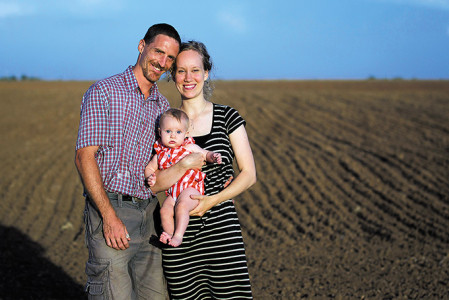By Nancy Frazier O’Brien
WASHINGTON (CNS) – Study after study has confirmed that those who are involved in religion and those who are married are healthier, physically and mentally happier and live longer than those who are not.
“The health benefits of marriage are so strong that a married man with heart disease can be expected to live, on average, 1,400 days (nearly four years) longer than an unmarried man with a healthy heart,” said Dr. Scott Haltzman, a clinical assistant professor of psychiatry and human behavior at Brown University in Providence, Rhode Island.
“This longer life expectancy is even longer for a married man who has cancer or is 20 pounds overweight compared to his healthy but unmarried counterpart,” Haltzman added. “The advantages for women are similar.”

A family is pictured on a field in 2013 outside their home in Nashville, Kan. The family and how it has changed in the last several decades will be under discussion when the extraordinary Synod of Bishops convenes at the Vatican Oct. 5. (CNS photo/Tyler Orsburn)
Couples with higher levels of religiosity “tend to enjoy greater marital satisfaction, fidelity and stability, with less likelihood of domestic violence,” according to a compilation of studies by the Heritage Foundation, a Washington-based think tank.
Religious belief and practice are also associated with lower divorce rates, lower levels of teen sexual activity, less abuse of alcohol and drugs, lower levels of many infectious diseases, less juvenile crime and less violent crime, the foundation said.
“Marriage and religion influence various dimensions of life, including physical health and longevity, mental health, happiness, economic well-being and the raising of children,” wrote sociologist Linda J. Waite and economist Evelyn J. Lehrer in a paper published in 2009 by the National Institutes of Health.
“We argue that both marriage and religiosity generally have far-reaching positive effects; that they influence similar domains of life; and that there are important parallels through which each achieves these outcomes,” they added.
In a 2012 interview, the late psychiatry professor Robert Coombs, from the University of California at Los Angeles, concurred on the positive effects of marriage. “Virtually every study of mortality and marital status shows the unmarried of both sexes have higher death rates, whether by accident, disease or self-inflicted wounds, and this is found in every country that maintains accurate health statistics,” he said.
As the extraordinary world Synod of Bishops on the family begins its work Oct. 5 at the Vatican, one of the challenges facing it will be raising awareness of the positive benefits of marriage on individuals, families and society as a whole.
“We know the numbers don’t lie about the impact divorce has on children,” Randall Woodard, an associate professor of theology/religion at St. Leo University in Florida, told Catholic News Service. “Nearly every social indicator is a lot lower (for those) raising children in a single-parent household, and I say that as a single father of three. A traditional family is not the only way to live, but it is the best way, generally speaking.”
Woodard said religious institutions may be uniquely suited to help families deal with their challenges.
“Churches provide tremendous support groups that can provide spiritual, financial and psychological help,” he said. “Being surrounded by people who share many of the same ideals can help reinforce others who may be struggling.
“Another way churches can help familial health is by knowing their own limitations,” Woodard added. “Many times people will come to the church with problems such as depression or other issues that are better resolved by medical professionals. Being that first point of contact can be very vital by encouraging them to seek medical help when necessary.”
(Copyright © 2014 Catholic News Service/United States Conference of Catholic Bishops. The CNS news services may not be published, broadcast, rewritten or otherwise distributed, including but not limited to, such means as framing or any other digital copying or distribution method in whole or in part, without prior written authority of Catholic News Service.)
